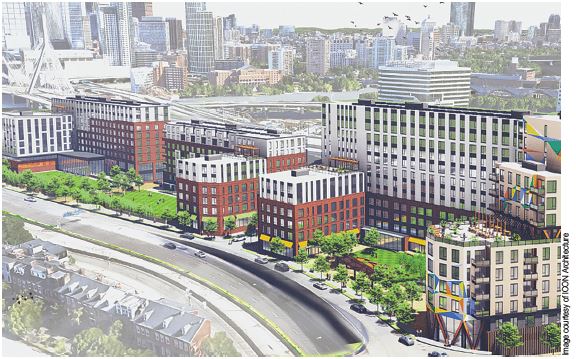State Regulations Set Definitions for Housing Category

Massachusetts residents are familiar with entreaties for production of more “affordable housing” from well-meaning government leaders and housing advocates.
The commonwealth does indeed suffer from a shortage of reasonably priced dwelling units, but before joining the chorus of promoters of “affordable housing,” one might want to consider the meaning of that term, and the consequences of affordable housing initiatives.
The state Executive Office of Housing and Livable Communities (EOHLC) plays a major role in housing development and affordable housing programs. It is responsible for administering local housing authorities and overseeing state-aided housing projects, urban renewal regulations, housing voucher programs, low-income housing tax credits, smart growth zoning and comprehensive permits for affordable housing projects. It also determines whether municipalities are in compliance with the MBTA Communities law.
EOHLC regulations define “affordable housing” as “homeownership or rental housing which is restricted to occupancy by low- or moderate-income households and for which the sales prices or rents are affordable to such households.” The regulations define “low- or moderate-income households” as those “with gross income at or less than 80 percent of area median household income as most recently determined by the U.S. Department of Housing and Urban Development (HUD) adjusted for household size.”
Housing production is the core of EOHLC’s mission.
Area median household income varies throughout Massachusetts, but it is generally in the vicinity of $100,000 per year. These definitions are essential to EOHLC’s affordable housing programs.
The city of Boston and many other municipalities have their own affordable housing requirements baked into their zoning ordinances and bylaws. Boston’s zoning mandate, known as “Inclusionary Zoning,” is particularly aggressive.
It requires new housing projects with seven or more dwelling units, to set aside up to 20 percent of units as income-re-stricted: 17 percent deed-restricted and another 3 percent set aside for holders of state or federal housing subsidy vouchers.
The Mayor’s Office of Housing (MOH) oversees compliance with Boston’s Inclusionary Zoning ordinance.
Boston Sets Minimum Requirement
In order for affordable housing programs to meet their goals, government agencies, such as EOHLC, MOH and local housing boards, must limit housing prices and rents on affordable units, and determine income eligibility of buyers and renters of those units. These monitoring agencies also must ensure that when affordable units are resold or relet, the household incomes of new occupants do not exceed eligibility limits.
These responsibilities require a lot of effort not only from monitoring agencies, but also from developers, landlords and property managers of affordable units.
To set pricing of affordable units and see that affordable units are only owned by or rented to income-eligible households, developers must accept deed restrictions under affordable housing agreements. These pricing and occupancy restrictions generally last for decades.
Developers intending to sell affordable units to homebuyers are expected to assemble and submit to monitoring agencies marketing plans directed at income-eligible buyers. Developers are sometimes required to give preferences to first-time home buyers, local residents or artists.
The deed restrictions limit resale prices on affordable units, to prevent owners from enjoying profits from a resale, and to verify that buyers meet income eligibility limits. Monitoring agencies must certify that resales meet these requirements.
Challenges in Upkeep and Monitoring
Similar restrictions apply to affordable rental units. Developers must present marketing plans acceptable to monitoring agencies, with limitations on rents and tenant incomes.
Affordable housing restrictions present interesting challenges.
For example, when properties inevitably require capital improvements or replacements, owners need the ability to recover their expenditures. Restrictions on resale prices and rents must be loosened to accommodate these expenditures, which owners of affordable units must verify with monitoring agencies.
Also, affordability restrictions on rental properties should be tailored to address increases to occupants’ income levels. Individuals who have low or moderate incomes when they first join the workforce often enjoy significant pay increases as they acquire skills, experience and responsibilities. Monitoring agencies should have mechanisms to prevent “over-income” households from enjoying the benefits of affordability restrictions intended for lower-income households.
Keeping track of tenant income, and moving over-income households out of affordable units to make room for income eligible households, can be difficult for monitoring agencies.
Affordable housing in Massachusetts has come to mean not inexpensive housing, but instead price-controlled housing set aside for lower-income individuals with associated governmental oversight. Imposing affordable housing requirements on developers might be good public policy, if combined with financial incentives that encourage production of more market-rate housing for the general public.
But, if local governments use overly restrictive zoning limitations to force developers to build affordable housing, and their restrictions result in less overall housing production, then it’s time to reevaluate those limitations.
Download the article as seen in Banker & Tradesman on December 30, 2024. Learn more about Christopher R. Vaccaro.


